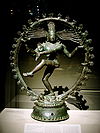Diti is a daughter of the Prajapati Daksha in Hinduism. She is a wife of the sage Kashyapa and the mother of the demonic race Daityas and the divine group of Marutas.

The daityas are a race of asuras in Hindu mythology, descended from Kashyapa and his wife, Diti. Prominent members of this race include Hiranyaksha, Hiranyakashipu, and Mahabali, all of whom overran the earth, and required three of Vishnu's avataras to be vanquished.

Dhanvantari is the physician of the devas in Hinduism. He is regarded as an avatar of Vishnu. He is mentioned in the Puranas as the god of Ayurveda.

The Pinaka is the celestial bow of the Hindu deity, Shiva. In popular legend, he is believed to have employed this bow in his avatar as Tripurantaka to annihilate the three cities of Mayasura, known as Tripura. The weapon is the origin of one of Shiva's epithets, Pinākapāṇi, literally meaning, 'The Wielder of The Pināka'.
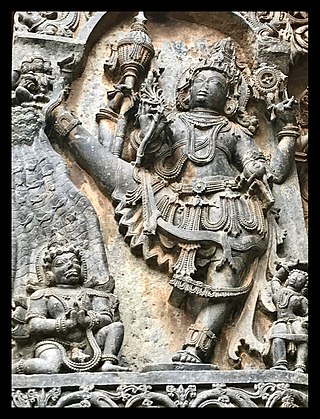
Trailokya literally means "three worlds". It can also refer to "three spheres," "three planes of existence," and "three realms".

Shikhandi is a character in the Hindu epic Mahabharata. Born as Shikhandini, daughter of Drupada, the King of Panchala, Shikhandi becomes male after agreeing to a sex exchange with a yaksha. He is the brother of Draupadi, the female protagonist of the epic, who is the common wife of the Pandavas.
The pitris are the spirits of departed ancestors in Hinduism. Following an individual's death, the performance of the antyesti is regarded to allow the deceased to enter Pitrloka, the abode of one's ancestors. The non-performance of these rituals is believed to result in the fate of wandering the earth as a restless preta.
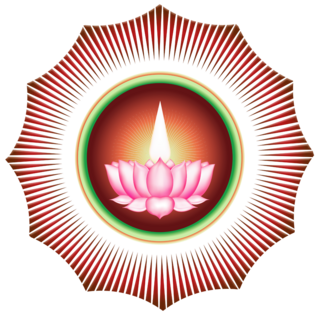
Tatvas are the 96 qualities or properties of human body according to Akilattirattu Ammanai, the religious book of Ayyavazhi. They are as follows:
Jahnu is a hermit-king in Hinduism, belonging to the Chandravamsha dynasty. The son of King Ajamīḍha, Jahnu abdicates his kingdom in favour of his son, Balākāśva, or sometimes Ajaka, and retires to perform a penance. According to the Harivamsa and Brahma Purana, he is also the husband of Kāveri.
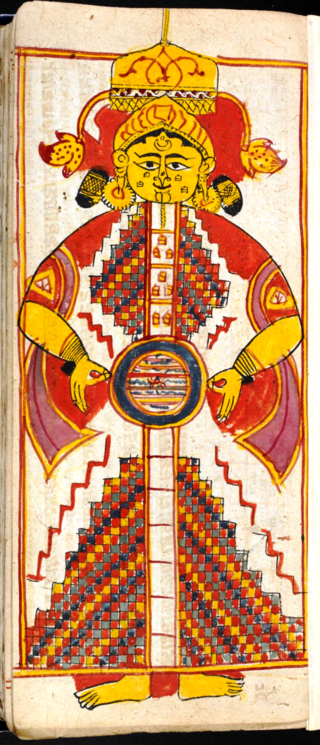
Loka is a concept in Hinduism and other Indian religions, that may be translated as a planet, the universe, a plane, or a realm of existence. In some philosophies, it may also be interpreted as a mental state that one can experience. A primary concept in several Indian religions is the idea that different lokas are home to various divine beings, and one takes birth in such realms based on their karma.

The Hindu marriage is the most important of all the samskaras, the rites of passage described in the Dharmashastra texts.
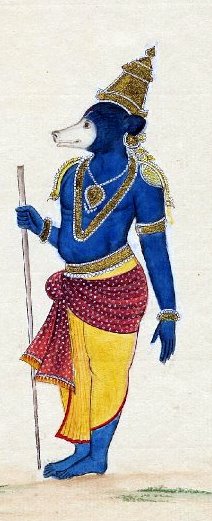
Jambavan, also known as Jambavanta, is the king of the bears in Hindu texts.
Pulastya is one of the ten Prajapati, and one of the mind-born sons of Brahma in Hinduism. He is also one of the Saptarishi in the first age of Manu, the Manvantara.

Sharanga also spelt as Saranga, is the celestial bow of the Hindu god Vishnu, primarily associated with his avatar of Rama. In South India, the Sharanga is also simply known as the Kodanda, literally meaning bow. Rama is often praised as Kodandapani, the holder of the Kodanda. The attribute of the bow is also mentioned in the Vishnu Sahasranama.

Tulasi Vivaha, also called Tulasi Kalyanam, is a Hindu festival, in which a symbolic ceremonial wedding takes place between a tulasi plant or holy basil and a shaligrama or an amla branch. Tulasi Vivaha signifies the end of the monsoon, and the beginning of the wedding season in Hinduism.

Vishvaksena or Vishwaksena, is the commander-in-chief of the army of the Hindu deity Vishnu, additionally serving as a gatekeeper and chamberlain of his celestial abode of Vaikuntha. As the embodiment of the tantras, Vishvaksena is worshipped before any ritual or function in the Vaikhanasas and Sri Vaishnavism sects. He occupies an important place in Vaikhanasa and Pancaratra temple traditions, where temple festivals often begin with his worship and procession.
Kratu is described as one of the manasaputras, the mind-born children of the creator deity, Brahma, in Hinduism. He is also a rishi, who appears in two different ages.
Bali is a king featured in Hindu literature. He is described to be the son of Sutapas and his wife Prishni. He rules a region named Anava, an eastern country as a member of the Chandravamsha.
Yadu is the founder of the Yadu dynasty in Hinduism. He is described to be the eldest son of King Yayati, and his queen, Devayani. He married five daughters of Nāga king.













